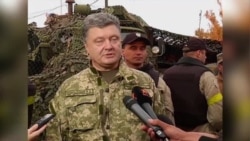Ukrainian President Petro Poroshenko has vowed to retake remaining rebel-held areas of eastern Ukraine, but says government forces will exercise restraint.
Speaking while visiting troops in the former rebel stronghold of Slovyansk, the president said there would be "no street fighting" in Donetsk. He called pro-Russian insurgents "just an annoyance" to residents of that eastern city, saying the only way forward is through peace, disarmament and amnesty.
While the two sides prepare for what could be a final battle, Moscow and Kyiv say a negotiated ceasefire is still possible - though some political analysts say Russia's strategic objective is to prolong the conflict.
According to Stanislav Belkovsky, founder and director of the Moscow-based Institute of National Strategy, retaing rebel-held parts of the country will be no easy task.
“The principal battles are still ahead," said Belkovsky. "Donetsk and Luhansk could be protected from Ukrainian forces much more efficiently by the separatists and by terrorists than small Slovyansk. So I would not exaggerate the real military significance of this victory."
The rebels are refusing to give up their weapons and have blown up bridges and fortified checkpoints leading to Donetsk in preparation for a fight.
"Now they are approaching a scenario that is least beneficial to them and most beneficial to us — a war in the city," said Alexander Khodakovsky, security chief of the self-proclaimed “Donetsk People's Republic. "So the numerical advantage in the level of troops is compensated by the conditions we will find ourselves in during the fighting."
Meanwhile, Russian Foreign Minister, Sergei Lavrov, is urging an unconditional ceasefire.
"They [rebels] are ready for that," said Lavrov. "But they are not ready to respond to ultimatum demands to capitulate and give in to the winners hoping for an amnesty, which was promised in President Poroshenko's peace plan, in order to pave the way for the dialogue."
Kyiv accuses Russia of supplying rebels with arms, a charge Moscow denies.
Many worry that Russian President Vladimir Putin could choose more direct military intervention to ensure the rebels' survival.
“Right now Putin's policy is to keep it stable and have a frozen kind of conflict, which would give Russia very good leverage over the government in Kyiv," said Pavel Felgengauer, a columnist with Moscow's Novaya Gazeta newspaper.
Meanwhile, the battle for Ukraine’s future continues — leaving lasting scars in the rebel-controlled east.





